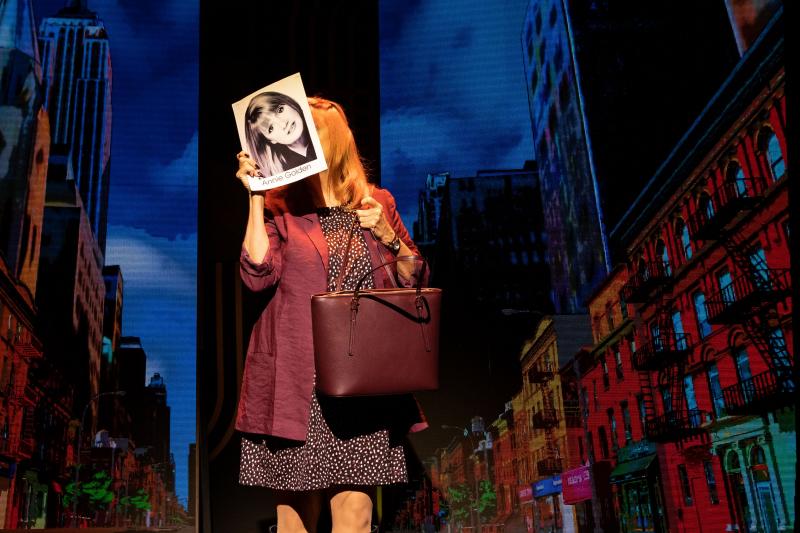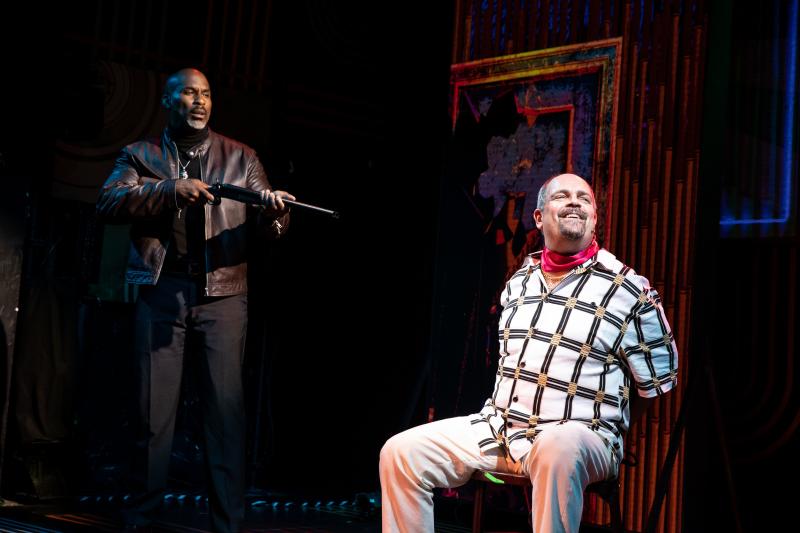Review: Joe Iconis Exploits Annie Golden's Sterling Vocals in Grindhouse Tribute BROADWAY BOUNTY HUNTER
Sometime between the era when a tap-dancing hopeful would go out there a youngster and come back a star and nowadays when tourists go out to Applebee's hungry and come back with a less than satisfying dining experience, many of the Broadway venues on that legendary strip of real estate called 42nd Street between 7th and 8th Avenues were converted into grindhouse theatres exclusively screening low-budget attractions in such genres as Blaxploitation, Martial Arts Flicks and Carsploitation.

Features like "Black Caesar," "Five Fingers of Death" and "Dragstrip Riot" may have had formulaic plots, stereotyped characters and lot of gratuitous violence, but during the 1970s they often gave actors of color rare opportunities to play leading, heroic roles instead of sidekicks.
So in their kick-ass fun new musical, Broadway Bounty Hunter, composer/lyricist/bookwriter Joe Iconis and co-bookwriters Lance Rubin and Jason SweetTooth Williams not only pay tribute to such genres but expand the concept into a new category.
"She's showing her stripes / And she is owning her rage / Cuz she's a woman of a certain age," goes the anthem of our leading player, a Broadway actress with an impressive resume who is no longer finding juicy roles available because she committed the industry sin of aging.
Beloved, impish theatre rock star Annie Golden not only plays the role but serves as its model. The book is scripted so that the character is named for whatever actress is playing her and details are altered to match her career, such as that of Saturday matinee alternate, Anne L. Nathan.
The one constant is that our leading lady, for the sake of the plot, is currently out of work, widowed and buried in bills. But life takes an unexpected turn when she's recruited by the mysterious Shiro Jin (cool, sleek Emily Borromeo) to join her team of bounty hunters.
"I'll admit you are an unconventional recruit," her new employer explains, "but I pride myself on thinking outside the box. I have heard your old cast albums, Ms. Golden, and your voice is quite ferocious. Besides, like all good actors, you have the most important skill for bounty-hunting: Commitment."
(Hopefully, Annie Golden will be recording a cast album for Broadway Bounty Hunter, because she does indeed sound ferocious belting out Iconis' hip collection of rocker/soul and funk selections, orchestrated with attitude by Charlie Rosen.)
Annie is paired with a partner for her first assignment and, as is usually the case with such ventures, he's not too happy about it.
"Hold up!" exclaims Lazarus, played with a smooth sparkle of loner machismo by Alan H. Green. "Everybody know I hunt alone."
Since the genres the musical pays tribute to often contain inside references directed to their specific audience, Broadway Bounty Hunter, true to its name, drops the occasional musical theatre gag, like Lazarus' frustration when, while driving down to Ecuador to capture the notorious Mac Roundtree (described in his Shaft-like theme as "a real bad mother drug pusha and a pimp daddy") Annie hogs the car stereo with her XANADU cast album.

(Photo: Matthew Murphy)
Mac arrives late in the game, but he's played with electric showbiz nastiness by Brad Oscar, whose second act rouser has him belting out, "I'm back, bitch, I'm back, bitch... I'm old white and rich, bitch, I'm back."
Mac, by the way, is the only character described in the script as white. Emphasizing how these films were meant to give employment to the marginalized, the authors specify that, aside from Annie and Mac, all roles must be played by actors of color. Director/choreographer Jennifer Werner's exuberant production features the terrific ensemble of Badia Farha, Jasmine Forsberg, Omar Garibay, Jared Joseph and Christina Sajous, all playing multiple roles.
While there's plenty of good-natured, mindless fun to be had at Broadway Bounty Hunter, there's also the lingering message of the lack of diversity in the stories being told in American popular entertainment. These grindhouse features may be seen as crude, and maybe offensive, to contemporary viewers, but they were steps that led closer to inclusion. And there are a few telling moments in the musical when the characters break their stereotypical molds to reveal further, more empathetic, complexities, reminding us of the greater opportunities yet to come.


